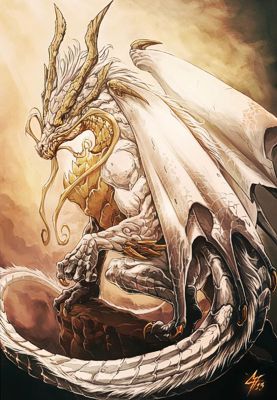

Monstrous Manual

| Climate/Terrain: | Temperate or cold seacoast |
|---|---|
| Frequency: | Very rare |
| Organization: | Solitary or clan |
| Activity Cycle: | Any |
| Diet: | Special |
| Intelligence: | Exceptional (15-16) |
| Treasure: | Special |
| Alignment: | Chaotic neutral |
| No. Appearing: | 1 (2-5) |
| Armor Class: | -1 (base) |
| Movement: | 9, Fl 24 (C), Sw 9 |
| Hit Dice: | 11 (base) |
| THAC0: | 9 (base) |
| No. of Attacks: | 3 |
| Damage/Attack: | 2-7/2-7/2-16 |
| Special Attacks: | Variable |
| Special Defenses: | Variable |
| Magic Resistance: | Variable |
| Size: | H (15’ base) |
| Morale: | Elite (15-16) |
| XP Value: | Variable |
Psionics Summary
| Level | Dis/Sci/Dev | Attack/Defense | Score | PSPs |
|---|---|---|---|---|
| = HD | 1/1/3 | MT,II/M-,MB | = Int | 120 |
Psychokinesis – Science: telekinesis; Devotions: animate object, control winds, molecular manipulation, soften.
Psychometabolism – Sciences: energy containment, life draining, metamorphosis; Devotions: biofeedback, body equilibrium, cause decay, chemical simulation.
Most topaz dragons prefer psychometabolic powers.
Topaz dragons are unfriendly and selfish. Though not malevolent, they are seldom pleasant to deal with because of their erratic behavior. Topaz dragons neither seek company nor welcome it.
At hatching, topaz dragons are a dull yellow-orange in color. As they age and their scales harden, the scales become translucent and faceted. Adult topaz dragons sparkle in full sunlight.
Topaz dragons speak their own tongue and the tongue common to all gem dragons, and 12% of hatchling topaz dragons have an ability to communicate with any intelligent creature. The chance to possess this ability increases 5% per age category of the dragon.
Combat: Topaz dragons dislike intruders, but avoid combat, often conversing to hide psionics or magic use. If intruders are hostile, or the dragon tires of them, it attacks, psionically first if possible, using spells as needed. They enjoy using teeth and claws, and usually save their breath weapon until wounded. The dragon may pretend to surrender to buy time, and retreats if greatly threatened. It usually makes one or more false retreats, attempting to come back and attack with surprise.
Breath Weapon/Special Abilities: This dragon’s breath weapon is a cone of dehydration, 70 feet long, 5 feet wide at the dragon’s mouth and 25 feet wide at the base. When directed against liquids, a cubic foot of water dries up per hit point of damage. Creatures caught by the cone can make a saving throw vs. breath weapon for half damage from water loss. Those who fail to save lose 1d6+6 Strength points; those who succeed lose only 1d6 Strength points. Curative spells less powerful than heal or regeneration are ineffective against Strength loss, though victims who are carefully nursed back to health recover one Strength point per day. Any creature reduced to a Strength of zero or less dies instantly. A topaz dragon casts spells and uses magical abilities at 5th level, plus combat modifier.
At birth, topaz dragons can breathe water and are immune to cold. As they age, they gain the following powers:
Young: protection from evil or good three times a day. Juvenile: blink three times a day. Adult: wall of fog three times a day. Mature adult: airy water three times a day, 10-foot radius per age category of the dragon. Old: part water once a day.
Habitat/Society: Topaz dragons live by the sea, often building or claiming caves below the waterline; they keep their caves completely dry. These dragons enjoy sunning on rocky outcroppings, enjoying wind and spray. They like water little and swim only to hunt or attack. They are indifferent parents at best, and abandon young to protect themselves. They dislike bronze dragons and attack them on sight.
Ecology: Topaz dragons prefer to eat fish and other aquatic creatures, especially giant squid.
| Age | Body Lgt. (’) | Tail Lgt. (’) | AC | Breath Weapon | Spells W/P | MR | Treas. Type | XP Value |
|---|---|---|---|---|---|---|---|---|
| 1 Hatchling | 2-9 | 2-5 | 2 | 1d6+1 | Nil | Nil | Nil | 2,000 |
| 2 Very young | 9-16 | 5-9 | 1 | 2d6+2 | Nil | Nil | Nil | 3,000 |
| 3 Young | 16-23 | 9-13 | 0 | 3d6+3 | Nil | Nil | Nil | 5,000 |
| 4 Juvenile | 23-35 | 13-17 | -1 | 4d6+4 | Nil/1 | Nil | E,Q | 7,000 |
| 5 Young adult | 35-44 | 17-23 | -2 | 5d6+5 | 1/1 | 10% | H,Q×3,T | 8,000 |
| 6 Adult | 44-53 | 23-29 | -3 | 6d6+6 | 1/1 1 | 15% | H,Q×5,T | 10,000 |
| 7 Mature adult | 53-59 | 29-33 | -4 | 7d6+7 | 1/2 1 | 20% | H,Q×7,T | 12,000 |
| 8 Old | 59-65 | 33-37 | -5 | 8d6+8 | 1 1/2 1 1 | 25% | H,Q×9,T×2 | 14,000 |
| 9 Very old | 65-70 | 37-41 | -6 | 9d6+9 | 1 1 1/2 2 1 | 30% | H,Q×11,T×2 | 15,000 |
| 10 Venerable | 70-75 | 41-45 | -7 | 10d6+10 | 2 1 1/2 2 1 1 | 35% | H,Q×13,T×2 | 16,000 |
| 11 Wyrm | 75-80 | 45-48 | -8 | 11d6+11 | 2 2 1/2 2 2 1 | 40% | H×2,Q×15,T×3 | 17,000 |
| 12 Great wyrm | 80-92 | 48-50 | -9 | 12d6+12 | 2 2 1 1/2 2 2 2 | 45% | H×2,Q×17,T×3 | 18,000 |
